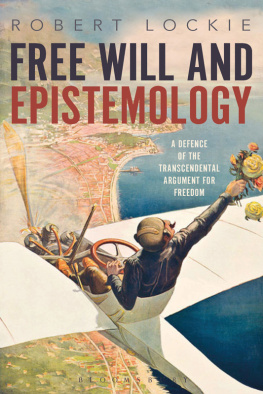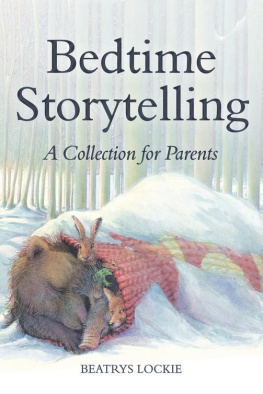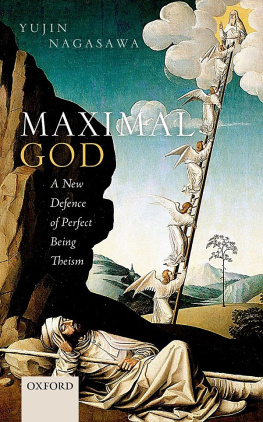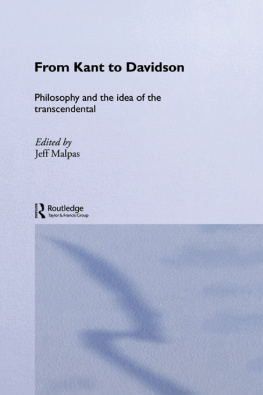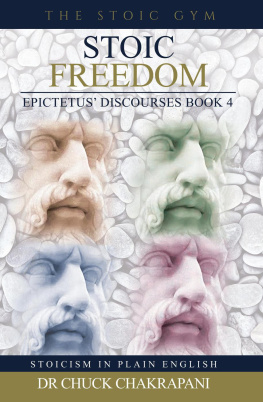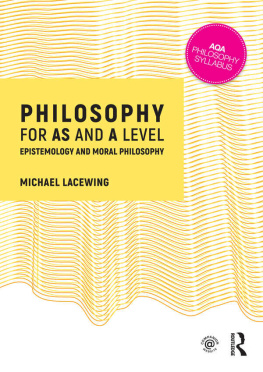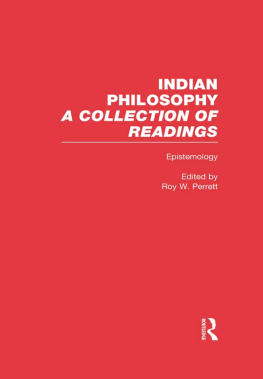Lockie - Free will and epistemology a defence of the transcendental argument for freedom
Here you can read online Lockie - Free will and epistemology a defence of the transcendental argument for freedom full text of the book (entire story) in english for free. Download pdf and epub, get meaning, cover and reviews about this ebook. City: London, year: 2018, publisher: Bloomsbury UK;Bloomsbury Academic, an imprint of Bloomsbury Publishing Plc, genre: Romance novel. Description of the work, (preface) as well as reviews are available. Best literature library LitArk.com created for fans of good reading and offers a wide selection of genres:
Romance novel
Science fiction
Adventure
Detective
Science
History
Home and family
Prose
Art
Politics
Computer
Non-fiction
Religion
Business
Children
Humor
Choose a favorite category and find really read worthwhile books. Enjoy immersion in the world of imagination, feel the emotions of the characters or learn something new for yourself, make an fascinating discovery.
- Book:Free will and epistemology a defence of the transcendental argument for freedom
- Author:
- Publisher:Bloomsbury UK;Bloomsbury Academic, an imprint of Bloomsbury Publishing Plc
- Genre:
- Year:2018
- City:London
- Rating:3 / 5
- Favourites:Add to favourites
- Your mark:
- 60
- 1
- 2
- 3
- 4
- 5
Free will and epistemology a defence of the transcendental argument for freedom: summary, description and annotation
We offer to read an annotation, description, summary or preface (depends on what the author of the book "Free will and epistemology a defence of the transcendental argument for freedom" wrote himself). If you haven't found the necessary information about the book — write in the comments, we will try to find it.
Lockie: author's other books
Who wrote Free will and epistemology a defence of the transcendental argument for freedom? Find out the surname, the name of the author of the book and a list of all author's works by series.
Free will and epistemology a defence of the transcendental argument for freedom — read online for free the complete book (whole text) full work
Below is the text of the book, divided by pages. System saving the place of the last page read, allows you to conveniently read the book "Free will and epistemology a defence of the transcendental argument for freedom" online for free, without having to search again every time where you left off. Put a bookmark, and you can go to the page where you finished reading at any time.
Font size:
Interval:
Bookmark:
Free Will and Epistemology
Also available from Bloomsbury
The Bloomsbury Companion to Epistemology, edited by Andrew Cullison
A Critical Introduction to the Epistemology of Perception, Ali Hasan
A Critical Introduction to Formal Epistemology, Darren Bradley
Indian Epistemology and Metaphysics, edited by Joerg Tuske
Free Will and Epistemology
A Defence of the Transcendental Argument
for Freedom
Robert Lockie
Bloomsbury Academic
An imprint of Bloomsbury Publishing Plc

Dedicated to the memory of my mother and father
Mathilde Katherine Lockie (ne Cahn), 19251999
John Andrew Robert Burns Lockie, 19222005
With love, gratitude and respect
This book is the product of more than two decades of thought about some of the most difficult issues in philosophy. It may not be adequate to the severity of the tasks it undertakes, but it is the best that I can do. I have attempted to argue to conclusions I believed once to be true, and I believe now to be both defensible and in need of strong and clear representation in the face of views I think less likely to be true, and less clearly defensible.
We are at a strange late stage in the history of analytic philosophy. Our discipline is highly professionalized, specialized, focussed. It prizes precision, deference to various (exceedingly developed) literatures and a certain conception of methodological rigour seemingly rather above many other things that might be valued. Philosophy has always needed rigour, and analytic philosophy, in its early and middle periods, represented a signal advance in this: embracing an admirable ethic of clarity. Increasingly, however, an arch, gruelling, house-style conception of rigour seems at odds with clarity; and especially with the aspiration for a bigger picture. A kind of neo-scholasticism prevails. Stylistic brutalism is widespread. Analytic cleverness is prized, but commonly situated within a largely undefended and often restrictive body of assumption. Any research question now drags behind it a vast and not always enlightening recent literature, often located within a contrived (and concealed) framework of presupposition and methodological commitment, frequently written in a wilfully harsh analyticalese with each such paper usually offering the return of very small gains, if indeed gains are to be found at all. Deference to said literature (and we are not here talking of the great works of philosophical history) is a requirement for those who wish to contribute to it and, more regrettably, for those who attempt to supersede it or finesse its framework of presupposition. The small proportion of graduate students who, after years of sacrifice in the increasingly soul-destroying major PhD programmes, eventually are permitted to enter the profession, in turn become highly professionalized, publish-or-perish, status-orientated gatekeepers to the discipline. They have a stake in its continuance in something like its present form. Only a handful of major figures are permitted the status of luminaries, the right to a more sweeping view and disruptive role and these figures are hardly major when judged by the standards even of our disciplines fairly recent history, much less by any longer view. The rest of us are permitted to plough the furrows of what, in natural philosophy, Kuhn called normal science puzzle-solving.
What has been lost in the cumulative, concentrative, individually understandable changes that have led us to this point is a consideration of our discipline itself its nature, what it is. This is not organic chemistry or computer science. Philosophy must of course be rigorous (this, to include some larger sense of rigour), but philosophy must also, in at least much of its ambit, involve the search for a bigger picture, an overview. And, as regards this talk of a larger sense of rigour: philosophy must also scrutinize critically, searchingly, its own methodological and metaphilosophical framework. It cannot be that we permit only the geniuses to seek after said bigger picture, or to radically and reflexively scrutinize our discipline; for any such figure we may be waiting a long time, and even a genius may struggle to prevail in the discipline we bequeath them. In terms of the reflexive epistemology/methodology/metaphilosophy of our discipline, we cannot build a philosophy (whether a philosophy or philosophy per se) only by placing brick upon brick. There must be some effort to develop a top-down view, and this not only for the Kants, the Descartes, and the Wittgensteins: a top-down view even for thee and me.
This work articulates my view of the nature of epistemic justification and free will, and the relationship between these. I have endeavoured to make it as plain and accessible as the difficult nature of these topics permits. Of course, this may mean my deficiencies in addressing these questions are all the more plainly visible. Although a research monograph, it is my hope that upper-level undergraduates may benefit from reading it. It is certainly my hope that graduate students and professional philosophers working in epistemology and free will should become aware of the positions being defended and thereby that those working in these areas should seek to take account of said positions. I hope this aspiration is realistic, inasmuch as the positions I defend are not unique to myself, and historically have been very important; though they have, for the most part, wanted quite badly for recent defences.
One position I defend permits me to acknowledge my first intellectual debt: to Richard Foley. Foley was my first teacher in epistemology on the Rutgers Graduate Program in the early 1990s and I was lucky to have such a teacher. Something close to his deeply subjective, perspectivist, deontically internalist conception of rationality/justification (Foley rationality for me, thin deontic internalism) I defend in the first part of this work and rely upon in the second. His influence on my work has been profound.
The next intellectual debt I wish to record is to Michael Morris. More years ago than I care to remember, Michael supervised both my first Masters and my eventual Doctorate. A precursor to much of what I say here he will have helped to shape, at least in some inchoate form. His impact on my philosophical development was very considerable; his influence leavens much of this work.
My next intellectual debt is to an academic community, a community presently and deplorably under threat. In 2010, I had the great privilege to participate in the last of three legendary summer schools in philosophy at the Central European University (CEU) namely, the Aspects of Responsibility summer school. CEU the best University in Hungary, and one of the best in central Europe, situated in the wonderful city of Budapest is now under targeted, existential threat from malign political forces playing to ancient prejudices. I pray that it survives, and enjoin all who read this to play their part in fighting for its survival; this ought to be a beacon issue for the academy in our times. I should like to thank the organizers of and fellow participants in this summer school for one of the best and most stimulating intellectual experiences of my life. In particular, I should like to thank Derk Pereboom, Mark Balaguer, Dana Nelkin, Tim OConnor and Andrs Szigeti. The latter three have read and commented upon versions of several of the later chapters in this book. I am hugely grateful to them; and subsequently to Andrs for helping to coordinate an Erasmus teaching fellowship for me at Linkping University in the summer of 2016. Others who have commented on individual chapters at various stages of this books development include Matthew Elton, Nikolaj Nottelmann, Carlos Moya, Tony Booth, Simon Langford, Lucy Allais and Elisa Galgut. This generosity is greatly appreciated. Others who have read or commented on earlier drafts or discussion presentations of overlapping or related work include Murali Ramachandran, Richard Gaskin, Craig Callender, Alex Barber, Nadja Rosental, Corine Besson, Michele Friend, Duncan Pritchard and Heather Battaly. Others who have assisted in the development of these ideas include Andy Clark, Mike Wheeler, Paul Davies, Pepa Toribio, Dan Haas, Gunnar Bjrnsson, Paul Russell, Brandon Warmke, Philip Robichaud, Zac Cogley, Jean-Baptiste Guillon and Susanne Uusitalo. I want further to mention David Hanney, Jef Mullins, James Pycock, Mark Hulbert, Hamid Vahid, Rick Peels, Shira Elqayam, Jonathan Evans, Ken Levy, Aaron Meskin and Mahon OBrien. I have given presentations of some of this work at colloquia, conference talks and workshops over the last twenty years too many to mention, but my thanks to all. is a partial reworking of my The regulative and the theoretical in epistemology,
Next pageFont size:
Interval:
Bookmark:
Similar books «Free will and epistemology a defence of the transcendental argument for freedom»
Look at similar books to Free will and epistemology a defence of the transcendental argument for freedom. We have selected literature similar in name and meaning in the hope of providing readers with more options to find new, interesting, not yet read works.
Discussion, reviews of the book Free will and epistemology a defence of the transcendental argument for freedom and just readers' own opinions. Leave your comments, write what you think about the work, its meaning or the main characters. Specify what exactly you liked and what you didn't like, and why you think so.

